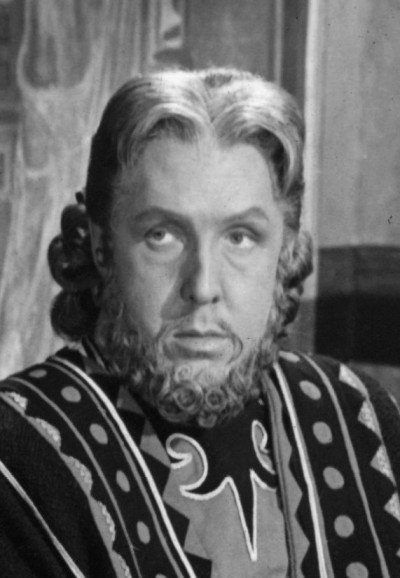Frank Thring (Frank William Thring)

Thring was born in Melbourne, the son of Frank Thring Snr. (known as F. W. Thring) and Olive (née Kreitmeyer), and was educated at the Melbourne Grammar School. His father was the head of the theatrical firm J. C. Williamson’s in the 1920s, and subsequently Efftee Studios in the 1930s, in Melbourne, Australia. He has been anachronistically claimed to have been the inventor of the clapperboard. Thring Sr. was also a noted film producer (The Sentimental Bloke), and partner in the nationwide Australian theatre circuit Hoyts. Thring Sr. died in July 1936 at the age of 52, when Frank Jnr was 10 years old. Frank said his earliest memory is of his mother standing on a stepladder in the foyer of the Regent Theatre in Melbourne, and arranging gladioli in the vases attached to the pillars. His career spanned more than 35 years, much of it spent alternating between stage, film and television. Perhaps his most famous role was that of Pontius Pilate in Ben-Hur (1959).
Thring trained as an actor at Melbourne radio station 3XY, which his family owned, and began acting in professional stage roles after his discharge from the Royal Australian Air Force in 1945. He made his British theatrical debut performing as Herod in Oscar Wilde’s play Salome in 1954. Two years later, he played Sir Lancelot Spratt in Doctor in the House, which ran for 240 performances at the Victoria Palace in London. He was Saturninus in the Royal Shakespeare Theatre production of Titus Andronicus with Laurence Olivier, Vivien Leigh and Anthony Quayle. He also played Captain Hook opposite Peggy Cummins’ Peter Pan. Among his other acclaimed stage roles were George Bernard Shaw’s Arms and the Man, Captain Ahab in Orson Welles’s Moby-Dick, Falstaff in Henry IV, Part 1, and Bertolt Brecht’s Life of Galileo. Another stage role was in the musical Robert and Elizabeth opposite June Bronhill and Denis Quilley. Later in life he returned to the stage playing the butlers in the Melbourne Theatre Company’s production of The Importance of Being Earnest in 1988. His final stage appearance was in Humorists Read the Humorists at the Melbourne International Comedy Festival in 1992.
One of Thring’s most well-known screen roles was as Pontius Pilate in Ben Hur[4] (1959). He also appeared as Al-Kadir, Emir of Valencia in El Cid (1961). Thring was also awarded the ‘Erik Kuttner Award for Acting’ (1965). In addition to these roles, Thring played a barrister in The Case of Mrs. Loring (1958), the usurping king Aella (Ælla of Northumbria) in The Vikings (1958) and Herod Antipas in King of Kings (1961). Thring is the only actor to portray on film both of the two historical figures directly responsible for authorizing the crucifixion of Christ. He played numerous glowering bad guys in Hollywood epics of the 1950s and 1960s. Back in Australia, he starred opposite James Mason and a young Helen Mirren in Michael Powell’s film Age of Consent (1969), and appeared in two biographical films about famous bushrangers: Ned Kelly (1970) and Mad Dog Morgan (1976). He played suave gangsters in Alvin Purple Rides Again (1974) and The Man from Hong Kong (1975). In his later years, his screen roles included the devilish Collector in Mad Max Beyond Thunderdome (1985), and a comedic role as an Alfred Hitchcock-like film director in the horror movie spoof, Howling III (1987). Thring’s television credits include the Australian miniseries Against the Wind and Bodyline. He was also the recurring villain Doctor Stark who would use mischievous means in attempts to steal Skippy and other animals out of Waratah National Park in several episodes of Skippy the Bush Kangaroo. He also acted in commercials, particularly one in which he would glare at the camera saying “You do have your television license. Don’t you?” He had the lead role in the 1959 ABC TV play Treason.
Off-screen, Thring was known for his flamboyant, often waspish, persona. He was featured in numerous TV commercials and guest-starring roles on popular weekly series, variety programs and quiz shows, often dressed in black funereal attire and other sinister costumes. However, his acting career was interrupted by bouts of alcoholism and periods of ill health. The interior of his house was featured in an Australian TV program and the walls were also black. Thring was appointed 1982 King of Moomba, “this doyenne [sic] of film and theatre looked nothing short of majestic in his regal garb and riding on a thespian-inspired float”. Thring was briefly married to actress Joan Cunliffe during the 1950s. The marriage ended in divorce. Joan lived in London, and was manager of both Rudolf Nureyev and Dame Margot Fonteyn. In 1994, Thring died from cancer, aged 68. He was cremated and his ashes scattered off the coast of Queenscliff, Victoria. A celebration of his life was held at the Victorian Arts Centre, Melbourne, in 1995.
Born
- May, 11, 1926
- Melbourne, Australia
Died
- December, 29, 1994
- Melbourne, Australia
Cause of Death
- cancer
Other
- Cremated

